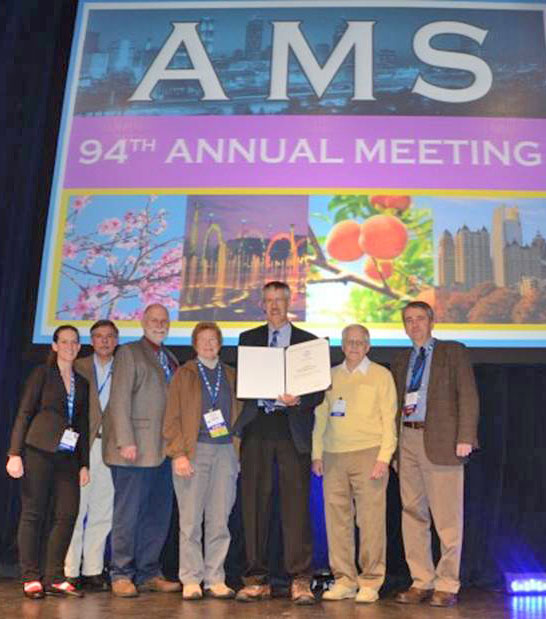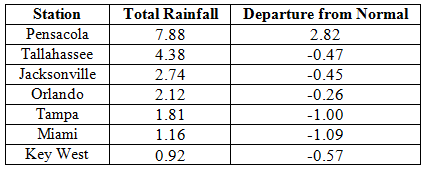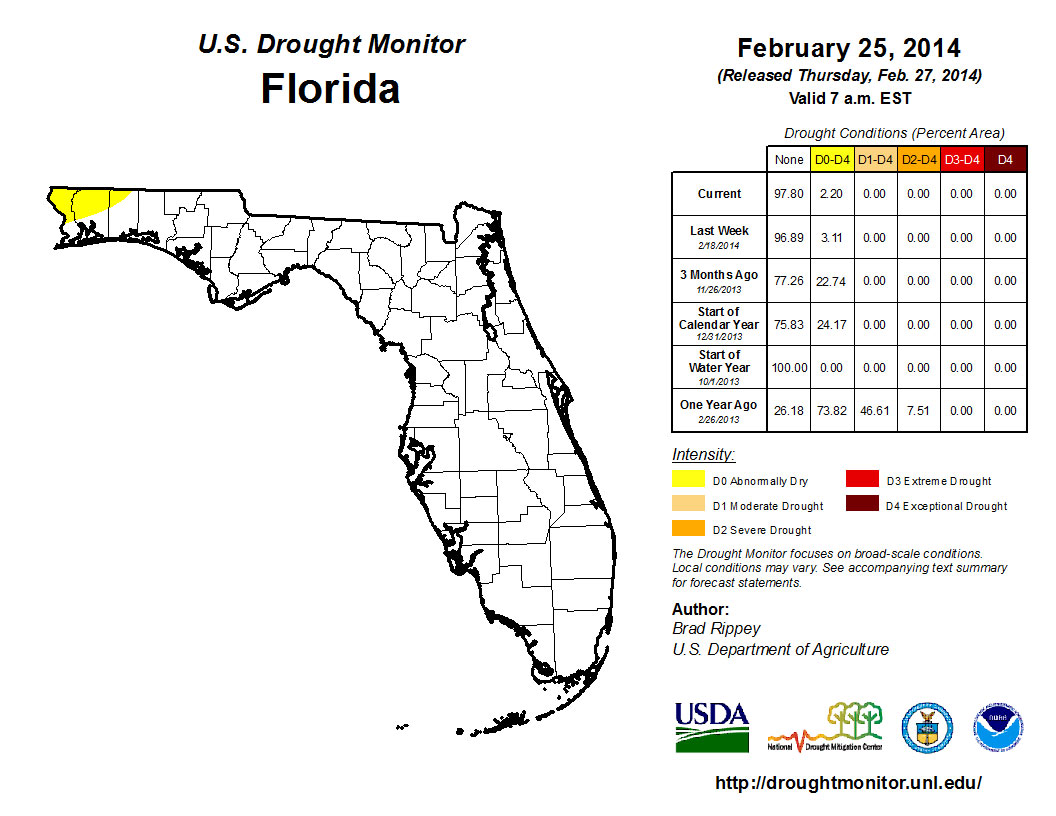 |
|
CoCoRaHS
F L O R I D A
A Community Collaborative
Rain, Hail & Snow Network
|
|
|
|
 |
 |
 |
 |
 |
 |
 |
 |
 |
 |
 |
 |
 |
The beginning of February took me to the 2014 Annual Meeting of the American Meteorological Society (AMS) in Atlanta, GA, where I was able to meet up with old friends and colleagues in between racing between conference sessions and giving my own poster presentation. The highlight of the entire conference was when Nolan took the stage at the banquet to accept an AMS Special Award, "for building a community of over 15,000 volunteer observers dedicated to providing high quality, reliable observations of daily precipitation across the United States." Thank you all for making this possible!
 
|
Spring Ahead!
Just a friendly reminder to everyone that Daylight Saving Time begins at 2:00 AM on Sunday, March 9th. Make sure that, before you go to bed the night of the 8th, you turn your clock ahead by one hour to reflect the change. Just to let you know, your CoCoRaHS observations will continue to stay on local time. If your normal observation time was at 7 AM EST, it becomes 7 AM EDT after the time change. This should help avoid some confusion, but if you have questions, please feel free to drop me an email.
|
March Madness
If you made your daily reports during the first few days of March, then you saw the notice about our annual March Madness contest. For those of you new to the network, we are running a little friendly competition at CoCoRaHS called 'March Madness' (not to be confused with the NCAA Basketball Tournament). We are trying to see which state can recruit the most observers in the month of March. Texas (traditional count) and Wyoming (per capita count) took home the 'CoCoRaHS Cups' last year. Even if we don't win the competition this year, I'd like to see if we are able to recruit at least 50 new observers in Florida this month. So if you know someone (relative or friend) who might be interested in joining the program, now would be a perfect time to get him or her to sign up.
For fun, CoCoHQ made a promotional trailer for the 2014 competition: http://youtu.be/pgDkbEDOtHU
|
Tip of the Month
I haven't done a 'Tip of the Month' in a while, but after getting a few questions since the beginning of the year on how condensation from fog or dew should be reported, I figured it would be a good time to dust off some information and post it for those that might have been wondering as well. This topic, I call upon the words of wisdom of Illinois coordinator, Steve Hilberg:
"During the transition months in the fall and spring, clear nighttime skies can lead to heavy dew, and if it is cold enough, frost. In the case of dew, if it is heavy enough the water may run down the funnel and into the center measuring tube registering a measurable amount. You should NOT report this as precipitation, but you can certainly include it in your observation notes. Dew is not precipitation - it forms by condensation. In most cases accumulations from dew are obvious (clear skies for several days, no rain reported anywhere else, etc.). In those cases where it is not obvious because there may have been rain in the area, then report the amount in the gauge and include a comment about the dew in the observation notes. The exception is when it is foggy, if you can feel a mist falling out of the fog, than it could be considered as precipitation and reported."
|
Quick Facts About January Observations
Registered Observers:
| 1,345 | Active Observers:
| 500 | Reports Submitted:
| 11,133 | Date of Most Reports:
| 436 on the 10th | Highest Rain Report:
| 3.41" on the 1st (FL-BV-1) |
|
February Rains
Portions of the Big Bend and Panhandle reported monthly rainfall totals near average or slightly above normal, while the rest of the state saw near to above average rainfall during February (Figure 1). Departures from normal roughly ranged from -1.61" to 2.82" (Table 1), though localized parts of Florida saw rainfall totals that were as much as 3.00" below normal to over 4.00" above normal. There was only one 24-hour precipitation record broken for the month (Table 2).
Table 1. February precipitation totals and departures from normal (inches) for selected cities.

Table 2. Select daily rainfall records (inches) broken during February (Compiled from NOAA, NWS)

Figure 1. A graphical depiction of the monthly rainfall departure from normal (inches) for January is given in the figure below (courtesy of NOAA, NWS).
|
February CoCoRaHS Totals
Here are the CoCoRaHS rainfall totals for February from some select CoCoRaHS stations across the state.
|
Current State of the Drought
At the end of January, nearly 30% of the state was characterized as dry, with the main concentration of the dryness (D0) confined to portions of the Space Coast and through the Okeechobee watershed into interior portions of the state to southwestern coast from Lee to Collier counties; and there was a small area of dryness reported in Escambia and Santa Rosa counties. Rains in the early part of the month eased most of D0 conditions in the Peninsula, with only Volusia, Seminole, Orange and Brevard counties showing dry conditions on the February 4th release of the Drought Monitor. By the 18th of the month, rainfall over portions of the east coast had led to an improvement of the lingering dry conditions and the only dry conditions left in the sate at the month's end were those in the northwest Panhandle. The Climate Prediction Center is forecasting for precipitation to be below normal for March, April and May, in the Panhandle, while else where, precipitation is expected to be near normal as the state begins the transition in to the dry spring season.

|
Odds and Ends
I continue to appreciate how understanding you observers are when you are contacted by someone at CoCoHQ or myself about a flagged rainfall value, and with how quick they were to reply to with validation or corrected totals. Please remember if you receive an email from me with the subject line 'Question About Your Recent CoCoRaHS Observation', please take a moment to answer me back. And if you have any questions, please feel free to contact me.
Make sure to check out the monthly Wx Talk Webinars offered by CoCoRaHS. Each month features a different weather related topic and gives a chance for our observers to interact with the speaker. If you are unable to attend or have missed some of the previous month's talks, you can find them archived on the CoCoRaHS YouTube site: http://www.youtube.com/cocorahs/
Make sure to like Florida CoCoRaHS on Facebook! Observers can now post comments and pictures to the wall.
|
|
|
|
 |
 |
 |
 |
 |
 |
 |
 |
 |
 |
 |
 |
 |
|
|
 |
 |
|
 |
|